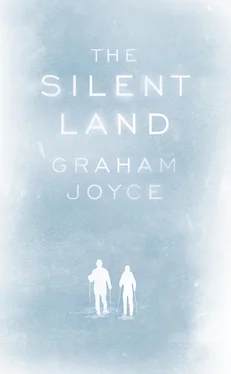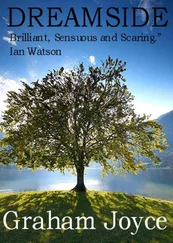The room had an open fireplace with a mantelpiece and above the mantelpiece a mirror. Brass candlesticks with new candles still in cellophane stood at either end of the mantelpiece. There were matches, so Zoe stripped the cellophane from the candles and lit them. She looked at her face in the mirror.
The silver amalgam on the mirror had misted and peeled in places and rusted in pinprick holes. The mirror must have hung there for over a hundred years. The light gave her a jaundiced look, and the rusting mirror loaned her some freckles. It was unflattering. She looked rather gaunt. The fireplace beneath the mantelpiece was full of ash. She bent down to touch it, looking for warmth, but it was damp and cold.
There were two old leather armchairs drawn up on either side of the fire, with lace doilies thrown across the back of them. The doilies had a shadow where heads had rested against them over the years. She could almost smell the sebum of the chairs’ occupants.
Framed photographs from two or three generations hung on the wall, the heavy wooden frames of the traditional photographic studies at odds with the chrome and plastic framed smaller pictures offering almost careless modern snapshots. Zoe could guess at the familial relationships, with a few 1970s colour shots—their photochemicals unfixing and fading—unable to compete with the vivid modern colour pictures of children.
It occurred to her that some of the people in the photos were the dead and some were the living and yet she felt equally divided from all of them.
A clock with its pendulum visible behind a glass case hung on the wall, its hands arrested at 8.50 a.m., which Zoe calculated could have been the exact time of the avalanche. She opened the case and swung the pendulum to reactivate the clock. The pendulum swayed back and forth several times with a sequence of reassuring clicks, but it died off. She tried again, but it died off again. She looked for a key, to wind the clock. It seemed important to her for a moment. Then she gave up.
She drifted from the kitchen to the workshop at the side of the house. There was a pleasing smell of wood shavings. She saw an orderly row of woodworking tools—chisels, planes, saws. Then she saw what the craftsman had been working on.
It was a coffin. The wood was still in its natural form—worked and precisely jointed, planed to a smooth finish but unveneered, waiting to be lined on the inside, dressed with handles outside and closed with a lid. She was fascinated and horrified. She stepped over to the coffin, half-expecting it to contain an embalmed corpse, but it was empty.
She heard someone come into the house. She turned smartly, and there was Jake framed in the doorway between the workshop and the living room. His face was in shadow but his eyes were swimming.
‘He was a coffin maker. The man who lived here. That was his trade.’
He peered into the coffin. ‘It’s about my size.’ Jake swung a leg up onto the workbench.
‘Don’t!’
He ignored her, stepping into the coffin and lowering himself to lie in it.
‘I’m going out,’ Zoe said and she rushed outside, leaving him to his morbid game.
Outside she waited by the tarpaulin with its load of logs. He was a long time, but she wouldn’t go back inside after him. Finally he came out and without a word he grabbed a corner of the tarp and began to drag it.
Zoe took another corner of the tarp. ‘That wasn’t funny.’
He snorted. ‘Yes it was. Was and is. It’s funny.’
‘No, it’s not. You think you’re being funny but you’re not.’
‘But it is funny. It’s very funny.’
‘No it’s not.’
‘Yes it is.’ And he let go a peal of unforced laughter, to show her how funny it was; and the ricochet of his laughter hung in the freezing air like a cruel spectre.
Zoe compressed her lips.
When they got back to the hotel, they found that the power had returned. But within ten minutes it went off again.
‘You have to laugh sometimes,’ Jake said in the darkness. ‘Remember my dad? You just have to. Laugh, I mean.’
Jake’s acquaintance with death had been very different from Zoe’s. When he first arrived at the hospital he found that his father had been given a private room at the end of the ward. His father, Peter, looked pretty weak, but he managed to lift his head from the pillow and blink at Jake.
‘Thank God you made it, Jake. These fucking clowns have no idea. I want an armed man posted on every door. You got that?’
‘It’s taken care of, Dad. It’s all in hand.’
Peter let his head sink back on the pillow. ‘Thank fuck you got here, that’s all.’
Jake had never heard his father swear before in his life. He’d heard him angry, critical, dismayed and occasionally made buoyant by a glass or two of cognac but he’d never heard him swear, cuss, or even blaspheme throughout his childhood or his mature life. Peter disapproved of swearing.
Which was difficult for Jake, because his days at university had given him a taste for a cocktail of the sacred and the profane. Hardcore swearing and blaspheming. He liked to say Jesus Fucking H. Christ without ever knowing what the ‘H’ stood for. He liked to say Holy Cunting Moses. One time a cupboard door at his father’s home was hanging loose and while Jake was fixing it the screwdriver slipped and gashed his hand and he’d screamed Cunt the Fucking Pharisee, which as an ex-Sunday School boy and one-time chorister he himself had found both strong and surprising.
His father, who had stood back watching, merely blinked and then walked out of the kitchen.
After a moment Jake had followed him, finding him in the living room, tight-lipped and running the Hoover over the carpet. Jake switched off the Hoover at the plug and showed Peter the wound on his hand.
‘What do you expect me to say? Oh Jehovah?’
‘Not even that.’
‘It’s just words!’
‘Having the cupboard door hanging off its hinges is rather less ugly than hearing that sort of language.’
‘Dad, you were in the war! You were in Special Ops! You saw men spill their guts! Surely you know what is important and what isn’t!’
Peter rarely leaked body language, any more than he did ‘bad’ language. He was a master of control. The only time he might inadvertently express surprise, irritation or pleasure would be a reflex in which he would reach up and pinch the right lens-frame of his glasses between thumb and index finger, as if to somehow increase the magnification of the lens. He did so now. ‘Does it ever occur to you that that might be the very reason why I don’t approve of coarse language in the house?’
Jake had thrown up his hands. In the house, out of the house. When going to visit Peter you always felt you should have taken off your shoes at the door: sooner or later you would be made to feel you had trailed something nasty in with you.
If Jake hung around long enough his father might take a bottle of cognac out of the sideboard and pour two rather meagre splashes into heavy, large brandy balloons. Jake always wanted to ask: why have such a big glass for such a small measure? Having a glass of cognac with his father was like being invited to have a drink with the Housemaster on the day it came to leave school. He would ask what your plans were and pretend to be interested and listen with an approximation of a smile until you were done.
Peter and Jake’s mother had divorced when he was twelve and his mother had gone to live in Scotland. The age gap between them—alluring and attractive to her when she’d met and married him—was a trial in later years. Ultimately she had been relieved to leave behind an aging husband. Jake had been sent to boarding school, something Zoe never let him forget, and which he couldn’t anyway.
Читать дальше












